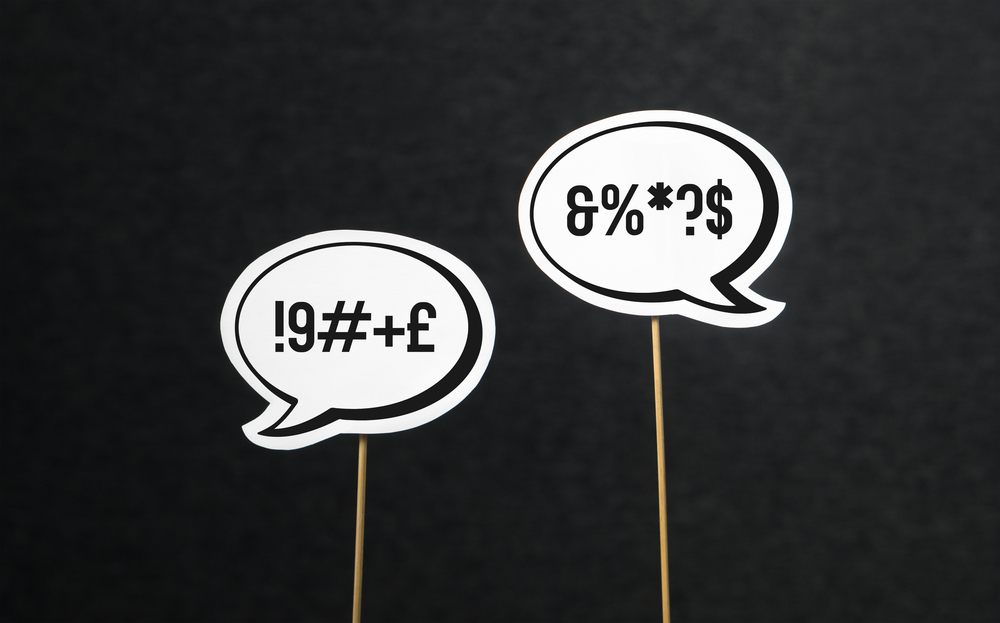Ohio’s disorderly conduct statute is fairly broad when it comes to the types of acts that fall under its umbrella. Under the broadly written statute (R.C. 2917.11), making an offensive statement could be considered disorderly conduct. But the broad prohibitions in the disorderly conduct statute are tempered by the First Amendment.
Given First Amendment freedom of speech rights, the only words that can be criminalized are what are called “fighting words.” In the context of an argument with a police officer, “fighting words” are usually curse words directed to an officer that are meant to incite violence. In contrast, profanity about the general situation are not considered “fighting words.”
This issue came up recently in State v. Thurman, 2016-Ohio-3002.
In that case, the Defendant cursed in his confrontation with the officer, but was found to not have said “fighting words” in violation of the disorderly conduct statute. In that case, since the officer had no probable cause to arrest for disorderly conduct, all evidence found during his pat down search were inadmissible (drugs, weapons).
Defendant Screamed Profanities at Officer When Questioned
In Thurman, Defendant was involved in a car accident in a parking lot. He did not want a police report filed, but instead gave the other driver his information stating he would pay for the damage. He did not have insurance.
The other driver wanted a report filed, so Defendant left the scene. The officer called was familiar with Defendant and found him across the street from his home on a neighbor’s porch. The officer found Defendant intoxicated and began questioning him about the accident.
Defendant responded it was none of the officer’s “[expletive] business” and “You’re not the [expletive] law.” The officer claimed it was loud enough that the whole block could hear. The officer warned the defendant that he would be arrested for disorderly conduct if he did not calm down.
Defendant called the officer (who was Caucasian) a racial slur used against African Americans. He then told him he was not going to talk to him and was going to get him fired. The officer placed him under arrest.
During the routine pat down, the officer found a knife and prescription drugs. Defendant filed a motion to suppress this evidence.
Ohio’s Disorderly Conduct Law
The Defendant was ultimately arrested for aggravated disorderly conduct.
The disorderly conduct statute in Ohio says (R.C. 2917.11(A)(2)(E)(3)(a)):
(A) No person shall recklessly cause inconvenience, annoyance, or alarm to another by doing any of the following: ***
(2) Making unreasonable noise or an offensively coarse utterance, gesture, or display or communicating unwarranted and grossly abusive language to any person; ***
(E)(3) Disorderly conduct is a misdemeanor of the fourth degree if any of the following applies:
(a) The offender persists in disorderly conduct after reasonable warning or request to desist.
What Are “Fighting Words” Under the Disorderly Conduct Law?
The Ohio Supreme Court has ruled that no one can be arrested for disorderly conduct based on words alone unless those words are likely to inflict injury or provoke the average person to immediately retaliate. (State v. Hoffman, 57 Ohio St.2d 129, 133, 387 N.E.2d 239 (1979)).
To trigger a disorderly conduct charge, the words must be considered “fighting words”. (State v. Beamer, Coshocton App. No. 11CA14, 2012-Ohio-2222).
Ohio courts have stated that words specifically and intentionally directed to a police officer usually constitute fighting words.
On the other hand, profanity when discussing the situation in general is not.
Examples of words directed to a police officer that courts have found to be “fighting words” qualifying as disorderly conduct include:
- ‘What are you going to do, [expletive]? You going to arrest me?’ State v. Dickey (1991), 75 Ohio App.3d 628, 630, 600 N.E.2d 365;
- “I hate all of you [expletive] cops * * * get out of my way you [expletive] cops,” Cincinnati v. Karlan (1974), 39 Ohio St.2d 107, 314 N.E.2d 162, paragraph three of the syllabus; and
- “‘You’re a [expletive][.]’ Hamilton v. Johnson (Dec. 3, 1999), Butler App. No. CA99–02–025, 1999 WL 1087024, *4, at *4.
By comparison, words directed to a police officer that, while vulgar, courts have not found to be ‘fighting words’ include:
- “Stay away from the [expletive] door, get the [expletive] out of here,” Kent v. Kelley (1975), 44 Ohio St.2d 43, 43, 337 N.E.2d 788;
- “The police are worthless,” Coshocton County, Case No. 2015CA0010 8;
- “This is [expletive]” Toledo v. Grince (1989), 48 Ohio App.3d 126, 127, 548 N.E.2d 999; and
- “‘Go ahead, tow the [expletive]” State v. Lamm (1992), 80 Ohio App.3d 510, 514, 609 N.E.2d 1286.”
In this case, the words used by Defendant did not incite violence, but instead the officer testified he simply did not appreciate being called names.
Ohio courts have held that police officers are expected to have a thicker skin than the general public. Here, the average police officer would not be expected to react with violence when faced with Defendant’s words. Further, the incident did not cause a crowd to gather nor did it incite anyone to act.
Thus, the words did not amount to “fighting words” and the officer lacked probable cause to arrest.
Therefore, the motion to suppress the evidence found following the stop was granted. The case, then, could not proceed with any evidence of the knife or prescription drugs found on the Defendant during the search.
If you have been charged with disorderly conduct and have questions about defenses related to your First Amendment rights (or other questions), talk to one of our Columbus disorderly conduct attorneys about your case at 614-361-2804.



